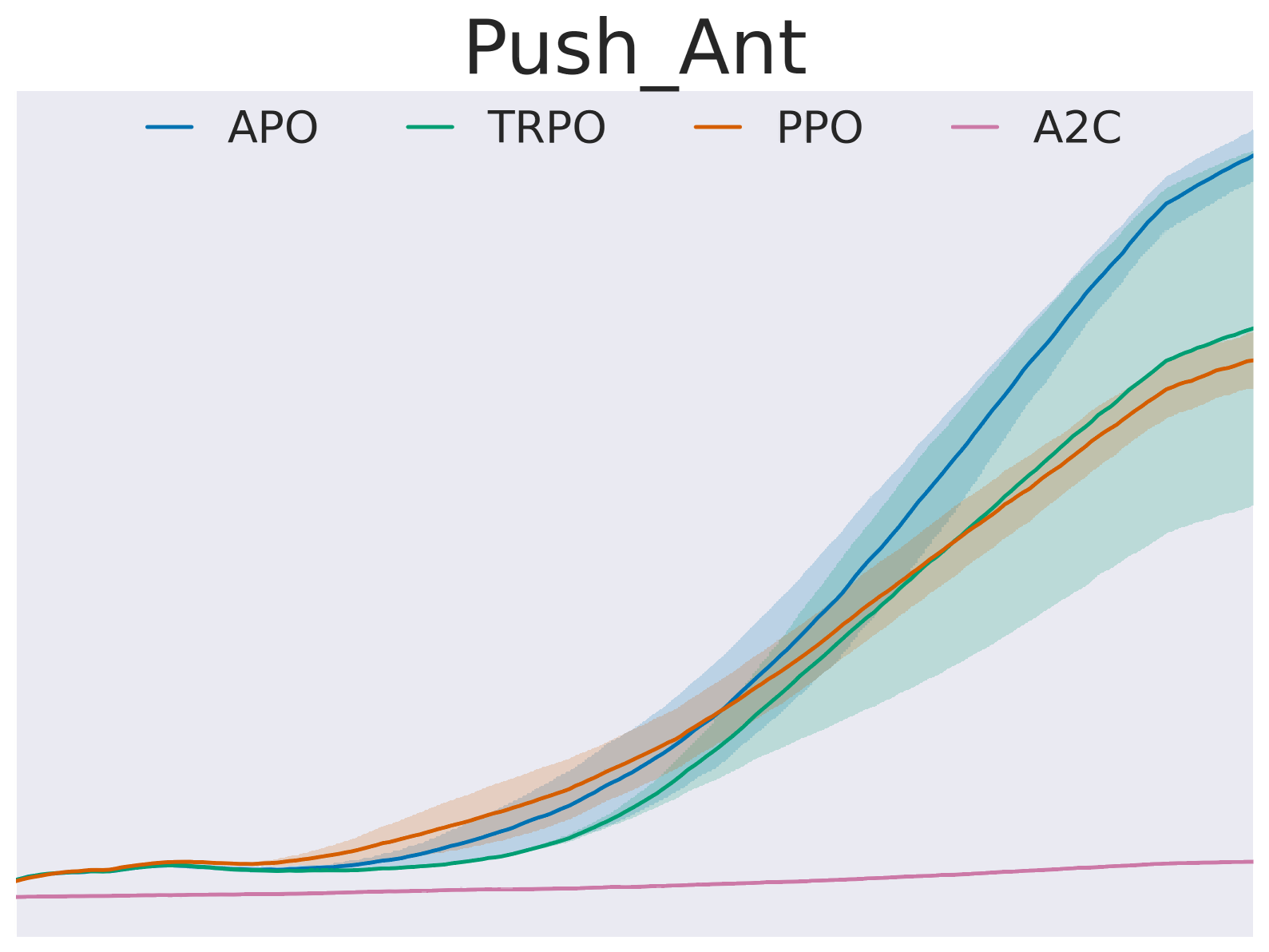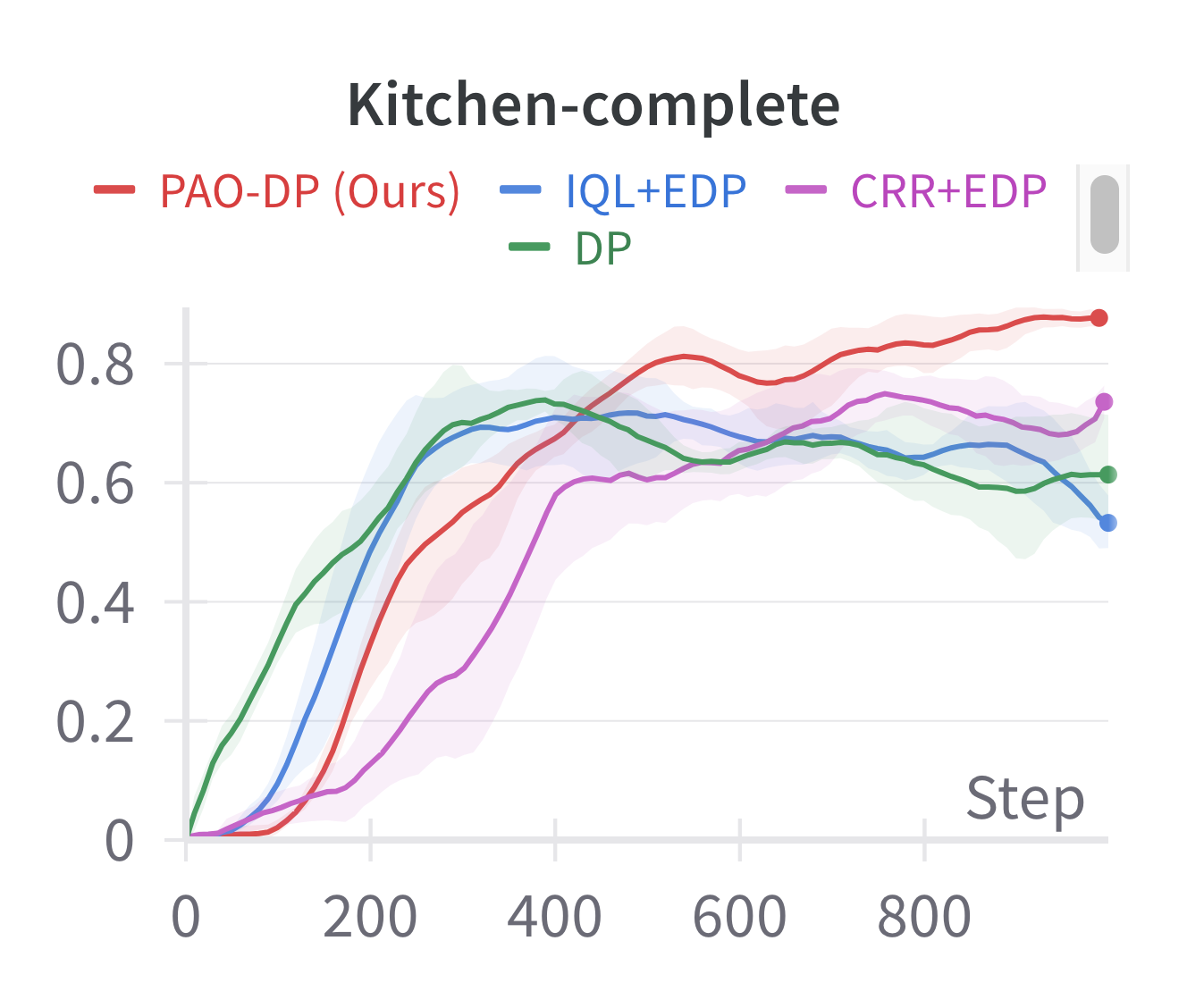A2PO: Towards Effective Offline Reinforcement Learning from an Advantage-aware Perspective
2403.07262

0
0

Abstract
Offline reinforcement learning endeavors to leverage offline datasets to craft effective agent policy without online interaction, which imposes proper conservative constraints with the support of behavior policies to tackle the out-of-distribution problem. However, existing works often suffer from the constraint conflict issue when offline datasets are collected from multiple behavior policies, i.e., different behavior policies may exhibit inconsistent actions with distinct returns across the state space. To remedy this issue, recent advantage-weighted methods prioritize samples with high advantage values for agent training while inevitably ignoring the diversity of behavior policy. In this paper, we introduce a novel Advantage-Aware Policy Optimization (A2PO) method to explicitly construct advantage-aware policy constraints for offline learning under mixed-quality datasets. Specifically, A2PO employs a conditional variational auto-encoder to disentangle the action distributions of intertwined behavior policies by modeling the advantage values of all training data as conditional variables. Then the agent can follow such disentangled action distribution constraints to optimize the advantage-aware policy towards high advantage values. Extensive experiments conducted on both the single-quality and mixed-quality datasets of the D4RL benchmark demonstrate that A2PO yields results superior to the counterparts. Our code will be made publicly available.
Create account to get full access
Overview
- This paper introduces a new offline reinforcement learning (RL) algorithm called Advantage-Aware Policy Optimization (AAPO) that outperforms existing methods on a range of challenging benchmark tasks.
- The key idea is to leverage information about the advantage function, which measures how much better an action is compared to the average, to guide the policy optimization process.
- The authors show that AAPO can achieve significantly better performance than prior state-of-the-art offline RL algorithms like Absolute Policy Optimization, Preferred Action Optimized Diffusion Policies for Offline Reinforcement Learning, and Goal-Conditioned Offline Reinforcement Learning Through State Distribution Matching.
Plain English Explanation
In reinforcement learning, the goal is to train an agent to take the best actions in an environment to maximize some reward. Traditionally, this is done by having the agent explore the environment and learn through trial and error. However, this can be slow and inefficient, especially for complex tasks.
Offline reinforcement learning offers a solution by allowing the agent to learn from a dataset of previous interactions, without having to explore the environment directly. This can be much faster and more sample-efficient, but it also presents its own challenges.
The key insight of this paper is that by focusing on the "advantage" of each action - how much better it is compared to the average - the agent can learn a more effective policy from the offline data. The authors call this approach "Advantage-Aware Policy Optimization" (AAPO), and show that it outperforms other state-of-the-art offline RL methods on a variety of benchmark tasks.
The advantage function essentially tells the agent which actions are the most promising, allowing it to concentrate its learning on those actions and avoid getting stuck in suboptimal behaviors. This can lead to faster convergence and better final performance, as the agent is able to more efficiently explore the most rewarding parts of the state space.
Technical Explanation
The Advantage-Aware Policy Optimization (AAPO) algorithm works by directly optimizing the policy to maximize the expected advantage of the actions taken, rather than just maximizing the expected return as in traditional policy gradient methods.
Specifically, the authors define a new objective function that combines the standard policy gradient term with an additional term that encourages the policy to assign higher probability to actions with higher advantage values. This has the effect of biasing the policy towards the most promising actions, which can lead to faster convergence and better final performance.
The authors show that AAPO outperforms other state-of-the-art offline RL algorithms like Absolute Policy Optimization, Preferred Action Optimized Diffusion Policies for Offline Reinforcement Learning, and Goal-Conditioned Offline Reinforcement Learning Through State Distribution Matching on a range of challenging benchmark tasks, including continuous control and discrete decision-making problems.
The key technical insights are:
- Defining an advantage-aware policy optimization objective that directly optimizes for high-advantage actions
- Developing a practical algorithm to optimize this objective using stochastic gradient descent
- Demonstrating the effectiveness of this approach on a diverse set of offline RL problems
Critical Analysis
The paper provides a compelling approach to offline reinforcement learning, but there are a few potential limitations and areas for further research:
-
The authors acknowledge that AAPO may struggle in environments with sparse rewards, as the advantage function becomes less informative. Exploring ways to make AAPO more robust to sparse reward settings would be an interesting direction for future work.
-
The paper focuses on batch-constrained offline RL, where the agent cannot interact with the environment during training. It would be interesting to see how AAPO compares to other methods in the more general offline RL setting, where the agent can actively query the environment but is still limited by the available offline data.
-
The authors do not provide a deep analysis of the failure modes of AAPO or how it compares to alternative approaches in terms of sample efficiency, training stability, or other key metrics. A more thorough empirical comparison with a broader set of baselines would help solidify the conclusions.
-
While the paper presents strong empirical results, a more in-depth theoretical analysis of the properties of the advantage-aware objective and its relationship to other policy optimization methods could provide additional insights.
Overall, the AAPO algorithm represents an interesting and promising advancement in offline reinforcement learning, but further research is needed to fully understand its strengths, limitations, and potential impacts on the field.
Conclusion
The "Advantage-Aware Policy Optimization for Offline Reinforcement Learning" paper introduces a novel offline RL algorithm that leverages information about the advantage function to guide the policy optimization process. The key insight is that by biasing the policy towards high-advantage actions, the agent can learn more effective behaviors from the available offline data.
The authors demonstrate that AAPO outperforms other state-of-the-art offline RL methods on a range of challenging benchmark tasks, suggesting that this approach could be a valuable tool for accelerating the development of reinforcement learning systems in real-world applications where direct interaction with the environment is costly or infeasible.
While the paper presents promising results, there are also several areas for potential improvement and further research, such as addressing sparse reward settings, exploring the broader offline RL setting, and conducting more in-depth theoretical and empirical analyses. Overall, the AAPO algorithm represents an important contribution to the field of offline reinforcement learning and could spur additional advancements in this rapidly evolving area of machine learning.
This summary was produced with help from an AI and may contain inaccuracies - check out the links to read the original source documents!
Related Papers

Adaptive Advantage-Guided Policy Regularization for Offline Reinforcement Learning
Tenglong Liu, Yang Li, Yixing Lan, Hao Gao, Wei Pan, Xin Xu

0
0
In offline reinforcement learning, the challenge of out-of-distribution (OOD) is pronounced. To address this, existing methods often constrain the learned policy through policy regularization. However, these methods often suffer from the issue of unnecessary conservativeness, hampering policy improvement. This occurs due to the indiscriminate use of all actions from the behavior policy that generates the offline dataset as constraints. The problem becomes particularly noticeable when the quality of the dataset is suboptimal. Thus, we propose Adaptive Advantage-guided Policy Regularization (A2PR), obtaining high-advantage actions from an augmented behavior policy combined with VAE to guide the learned policy. A2PR can select high-advantage actions that differ from those present in the dataset, while still effectively maintaining conservatism from OOD actions. This is achieved by harnessing the VAE capacity to generate samples matching the distribution of the data points. We theoretically prove that the improvement of the behavior policy is guaranteed. Besides, it effectively mitigates value overestimation with a bounded performance gap. Empirically, we conduct a series of experiments on the D4RL benchmark, where A2PR demonstrates state-of-the-art performance. Furthermore, experimental results on additional suboptimal mixed datasets reveal that A2PR exhibits superior performance. Code is available at https://github.com/ltlhuuu/A2PR.
6/4/2024

Absolute Policy Optimization
Weiye Zhao, Feihan Li, Yifan Sun, Rui Chen, Tianhao Wei, Changliu Liu

0
0
In recent years, trust region on-policy reinforcement learning has achieved impressive results in addressing complex control tasks and gaming scenarios. However, contemporary state-of-the-art algorithms within this category primarily emphasize improvement in expected performance, lacking the ability to control over the worst-case performance outcomes. To address this limitation, we introduce a novel objective function, optimizing which leads to guaranteed monotonic improvement in the lower probability bound of performance with high confidence. Building upon this groundbreaking theoretical advancement, we further introduce a practical solution called Absolute Policy Optimization (APO). Our experiments demonstrate the effectiveness of our approach across challenging continuous control benchmark tasks and extend its applicability to mastering Atari games. Our findings reveal that APO as well as its efficient variation Proximal Absolute Policy Optimization (PAPO) significantly outperforms state-of-the-art policy gradient algorithms, resulting in substantial improvements in worst-case performance, as well as expected performance.
5/31/2024

Preferred-Action-Optimized Diffusion Policies for Offline Reinforcement Learning
Tianle Zhang, Jiayi Guan, Lin Zhao, Yihang Li, Dongjiang Li, Zecui Zeng, Lei Sun, Yue Chen, Xuelong Wei, Lusong Li, Xiaodong He

0
0
Offline reinforcement learning (RL) aims to learn optimal policies from previously collected datasets. Recently, due to their powerful representational capabilities, diffusion models have shown significant potential as policy models for offline RL issues. However, previous offline RL algorithms based on diffusion policies generally adopt weighted regression to improve the policy. This approach optimizes the policy only using the collected actions and is sensitive to Q-values, which limits the potential for further performance enhancement. To this end, we propose a novel preferred-action-optimized diffusion policy for offline RL. In particular, an expressive conditional diffusion model is utilized to represent the diverse distribution of a behavior policy. Meanwhile, based on the diffusion model, preferred actions within the same behavior distribution are automatically generated through the critic function. Moreover, an anti-noise preference optimization is designed to achieve policy improvement by using the preferred actions, which can adapt to noise-preferred actions for stable training. Extensive experiments demonstrate that the proposed method provides competitive or superior performance compared to previous state-of-the-art offline RL methods, particularly in sparse reward tasks such as Kitchen and AntMaze. Additionally, we empirically prove the effectiveness of anti-noise preference optimization.
5/30/2024

Augmenting Offline RL with Unlabeled Data
Zhao Wang, Briti Gangopadhyay, Jia-Fong Yeh, Shingo Takamatsu

0
0
Recent advancements in offline Reinforcement Learning (Offline RL) have led to an increased focus on methods based on conservative policy updates to address the Out-of-Distribution (OOD) issue. These methods typically involve adding behavior regularization or modifying the critic learning objective, focusing primarily on states or actions with substantial dataset support. However, we challenge this prevailing notion by asserting that the absence of an action or state from a dataset does not necessarily imply its suboptimality. In this paper, we propose a novel approach to tackle the OOD problem. We introduce an offline RL teacher-student framework, complemented by a policy similarity measure. This framework enables the student policy to gain insights not only from the offline RL dataset but also from the knowledge transferred by a teacher policy. The teacher policy is trained using another dataset consisting of state-action pairs, which can be viewed as practical domain knowledge acquired without direct interaction with the environment. We believe this additional knowledge is key to effectively solving the OOD issue. This research represents a significant advancement in integrating a teacher-student network into the actor-critic framework, opening new avenues for studies on knowledge transfer in offline RL and effectively addressing the OOD challenge.
6/12/2024